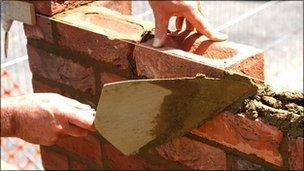Vocational education has 'lost its way', says Gove
- Published

The government wants vocational courses to be more 'hands on'
Education Secretary Michael Gove has announced a review of vocational education in England, which he says "lost its way" under Labour.
Mr Gove said the last government had allowed an increase in "pseudo-academic" courses which had been used to boost league table figures.
He said he wanted to create "university technical colleges" specialising in practical skills.
The Nasuwt teachers' union said the policy could be "socially divisive".
"The last government presided over a pasteurised, homogenised, and bureaucratised hollowing-out of practical education," Mr Gove said, in a speech at the Edge, a London-based organisation promoting vocational training.
"Everything was reduced to fit tables of achievement designed to generate ministerial boastfulness," he said.
Craftsmanship
Vocational qualifications include Btecs, City and Guilds and OCR Nationals, and cover subjects ranging from IT and construction skills, to dance, hospitality and catering.
The number taken has risen 24-fold in the past five years.
But Mr Gove said it was "striking" the expansion coincided with the decision to designate vocational qualifications as equivalent to up to four GCSEs and to count them in school league tables.
"This has meant that some schools have been tempted to steer students towards certain qualifications because it appears to be in the school's interests even when it's not in the student's," Mr Gove said.
Some courses were "pseudo-academic" and did not place enough emphasis on skills and craftsmanship, he said.
He said he wanted to see at least 12 "university technical colleges" opened.
These would be academies - schools operating outside of local authority control - and each would be sponsored by a local business and a local university.
Students could opt to attend from the age of 14, and would participate in skills-based learning as well as academic courses.
He said his free schools policy, under which parents, teachers and other interest groups can set up schools, would also offer opportunities to create vocationally focused schools.
League tables
Mr Gove said he wanted vocational courses to be "complemented by a base of core academic knowledge".
Earlier this week he said he wanted to create an English version of the "baccalaureate" qualification, which would be awarded to students gaining A*-C passes in maths, English, a science, a language and a humanities subject.
He said he wanted to use this as a new league table measure "to encourage schools to give all young people a broad and rounded base of knowledge".
The Nasuwt said the vocational education review was "a naked attempt to advance the flawed policy of academies and free schools".
It said the Mr Gove's proposals risked "widening the divide between academic and vocational learning".
"There is strong and compelling evidence that establishing new academies and free schools to deliver vocational education will be socially divisive and will widen educational inequality," the union said.
'Rigour'
Professor Alison Wolf, an expert on education and skills from Kings' College London, is to head the review.
It will look at "ways to improve vocational education's organisation and responsiveness to a changing labour market, and to ensure vocational education is progressing young people to the next stage," the Department for Education said.
The Pearson exam board has defended the "rigour" of Btec qualifications, while OCR says its courses incorporate "practical, applied learning - founded on a solid base of knowledge and understanding".
England's exams watchdog Ofqual is also studying how A-levels and GCSEs compare to other qualifications, including some vocational options.
But it is not investigating the allocation of point scores to different qualifications in school league tables.
- Published21 October 2011
- Published2 July 2010